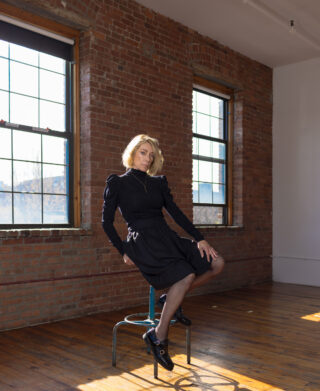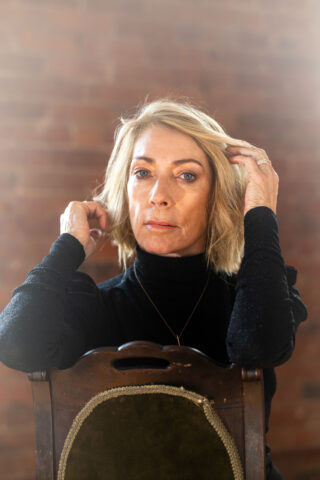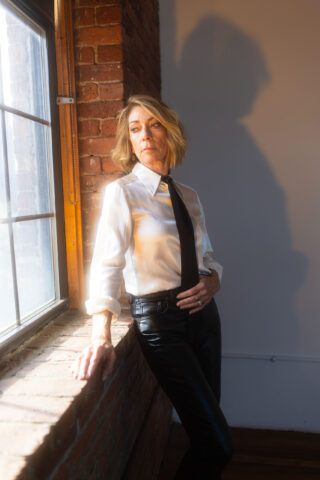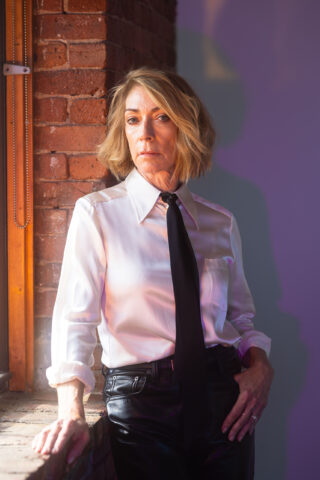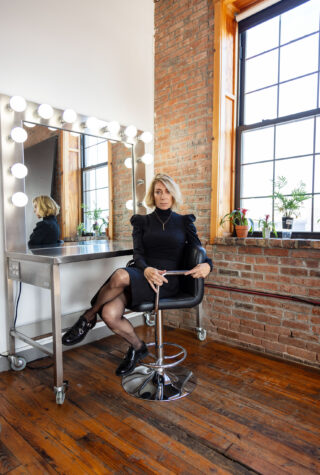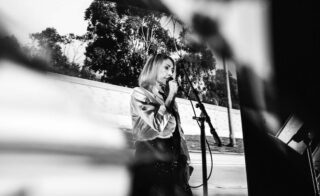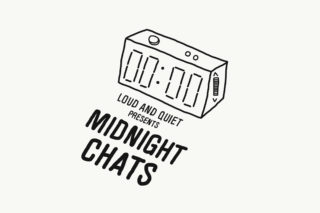Collaged into L.A.
“I’m not a huge drug taker, but I feel like I fantasise about it more than I actually do it,” Gordon says. “It’s kind of like a weird fantasy. Everyone is so escape-oriented now because the world is so fucked up, that it’s a little fatalistic, but then I also want to get into it and take as far as we can.”
The intense peak of The Collective is ‘Psychedelic Orgasm’, which presents a bad-trip version of L.A. As well as exploring our need to escape from reality, it also highlights the placelessness of the album. Gordon has now been back in Los Angeles, where she grew up, for over half a decade, and although she’s still heavily associated with New York, she hasn’t lived there full-time for twenty years.
“It’s weird. I have such a connection to California and yet I still feel on the edge of L.A. But that’s what I like about it, I guess. My friend who moved from Chicago, when people ask him, he says, ‘I think I’m collaged into L.A’, and I think that’s a good way to put it.”
Gordon has moved around for most of her life. It’s fitting that the opener to her new album is framed around a packing list. Sometimes, the locations on songs shift halfway through, such as on ‘Tree House’, a blast of guitar and voice that blends time-periods.
“It was kind of about memory, going up and hitchhiking up to Big Sur with my friend when we were teenagers and doing wild things. The other part was because I was reading this Marguerite Duras book, The Lover. It takes place in Vietnam, and it sort of reminded me of when I was 12 and 13 living in Hong Kong, so coming of age, looking way older than my age. My mother allowed me to roam around in the streets. We lived out in the new territories which was British at the time. We went to school in town, and you had sailors leering at you.”
Element of Danger
“Every night the songs get a little more evolved, and the band’s more melded.” It’s December, and the dance piece Takemehome has now had its shows in Los Angeles, New York and Tijuana. “It was interesting, and sort of like being a band on tour,” Gordon tells me.
The Tijuana leg especially sounds memorable. The dancers performed at Cine Bujazán, an abandoned art deco cinema, which has been converted by two brothers into an arts and event space. It even has a small film school. Currently, there’s no roof over it, and so the dance was outside on a makeshift stage. Gordon is excited when describing it.
“After the dress rehearsal, they realised that all this dew had fallen on the rubber mat that covers the wood part of the stage, and the dancers were slipping around. For the best part of an hour before the performance they had to rip off the matting, paint a couple of the squares that weren’t black, dry it with a hairdryer and all this stuff. It was still rough wood, so the dancers all wore shoes.”
During the performance, one dancer broke a square on the stage with an energetic jump, leaving a crevice. “It all added this element of danger to the evening, which kind of inspired the dancers in a way,” Gordon says. “They were really super on fire that night.”
It sounds similar to how you might imagine things to go during Sonic Youth or Free Kitten shows in DIY venues, which Gordon agrees with. “At a festival, you don’t have time for soundcheck, and you think the worst is going to happen, and it turns out to be an amazing show. You never know.”
We speak on Zoom in a follow-up chat. It’s only been two months and it feels like we have a lot to discuss, both with her work and with the world. Though Gordon speaks about that need to be caught up with the news, she’s less quick to post about it. Leaving her social presence to Instagram (“I try not to go on X or Twitter or whatever the fuck it is. It’s just stupid”), she posts occasionally about her work, her daughter or an absurd thing she’s seen while walking around.
“When I do get really angry, I do want to post something, usually something about politics. Generally, I try not to post too much. I think it can be obnoxious quickly. Just because you have a platform, doesn’t mean you should use it all the time.”
It’s the story of Kate Cox that has made Gordon want to post something today. Cox is a mother of two, who was 20 weeks pregnant with a baby that would likely die during childbirth or soon after, due to a chromosomal abnormality. “She’s in a lot of pain right now because of what’s going on with the baby,” Gordon says. “It could ruin her fertility chances as well as possibly other things.”




